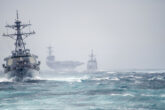November 07, 2017
The Sum of Their Fears: The MQ-25 Stingray
“Something is rotten in the state of Denmark,” sayeth the Bard in a line with ominous foreboding. Such potent can also be read into the decision that Northrop Grumman was dropping out of the competition for the navy’s MQ-25 unmanned tanker. Concerns have been rising since Naval Aviation’s issuance of a request for proposals (RFP) for the MQ-25 Stingray aircraft earlier this month. The description of what is to be the navy’s first unmanned aircraft to operate from a supercarrier, a mission tanker, seemed “off” or “fuzzy” in numerous ways, but the actual document itself so far has not been publicly available for review and hope remained that its contents would provide a path to continued relevance for both the carrier air wing and the supercarriers they flew from. However, Northrop’s decision, along with rumors that another major aviation company is also considering withdrawing, represent fears that the situation within U.S. Navy acquisitions is far from healthy. In fact, it seems we are in for a repeat of a situation that played itself out earlier this year.
The U.S. Navy, through Naval Air and Naval Sea Systems Command, had asked industry for a new long-range surface-to-surface missile. It appeared that the navy had been much impressed with the Raytheon partnered, Norwegian built, Kongsberg Naval Strike Missile after test firing it from the Littoral Combat Ship USS Coronado in 2014 and was looking towards that missile to gradually replace its aging supply of Harpoon missiles over the next decade. A sole source selection process was not followed and an open competition commenced with Raytheon-Kongsberg, Lockheed-Martin and Boeing emerging as competitors. Earlier this year, both Boeing and Lockheed suddenly dropped out of the surface-to-surface competition within days of each other, each citing concerns that the process did not fairly value their designs. Lockheed politely stated, as part of its withdrawal statement, “As the current OTH-WS request for proposal (RFP) process refined over time, it became clear that our offering would not be fully valued.” Boeing went further, bluntly stating that the navy had refined its requirements downward throughout the process, and that they “would have to take a lot of capability out of this existing system and really deliver a less-capable weapon system.”
Read the full op-ed in The National Interest.
More from CNAS
-
To Focus on China, U.S. Needs to Wean off Europe and Middle East Missions
If the United States cannot rebalance its military focus toward the Indo-Pacific it risks expediting Chinese aggression in the region and furthering the decline of the US-led ...
By Carlton Haelig
-
The Evolution of Drones with Stacie Pettyjohn, Center for a New American Security
Stacie Pettyjohn, Senior Fellow and Director of the Defense Program at the Center for a New American Security, joins Squaring the Circle to discuss the evolution of drones. ...
By Stacie Pettyjohn
-
It’s Time for a True Industrial Strategy for American National Security
For an industrial strategy to work, the president must make it a White House priority that pulls together all elements of national power....
By Becca Wasser & Mara Rudman
-
Sharper: Allies and Partners
Amid intensifying geopolitical challenges, the United States is finding new ways to address security issues by cultivating and strengthening alliances and partnerships. How ca...
By Gwendolyn Nowaczyk & Charles Horn




